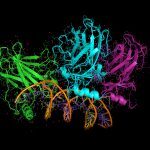Lien vers Pubmed [PMID] – 32929970
Lien DOI – 10.1021/acs.jproteome.0c00351
J Proteome Res 2020 Oct; ():
The current technique used for microbial identification in hospitals is matrix-assisted laser desorption/ionization time-of-flight mass spectrometry (MALDI-TOF MS). However, it suffers from important limitations, in particular, for closely related species or when the database used for the identification lacks the appropriate reference. In this work, we set up a liquid chromatography (LC)-MS/MS top-down proteomics platform, which aims at discriminating closely related pathogenic bacteria through the identification of specific proteoforms. Using Escherichia coli as a model, all steps of the workflow were optimized: protein extraction, on-line LC separation, MS method, and data analysis. Using optimized parameters, about 220 proteins, corresponding to more than 500 proteoforms, could be identified in a single run. We then used this platform for the discrimination of enterobacterial pathogens undistinguishable by MALDI-TOF, although leading to very different clinical outcomes. For each pathogen, we identified specific proteoforms that could potentially be used as biomarkers. We also improved the characterization of poorly described bacterial strains. Our results highlight the advantage of addressing proteoforms rather than peptides for accurate bacterial characterization and qualify top-down proteomics as a promising tool in clinical microbiology. Data are available via ProteomeXchange with the identifier PXD019247.






